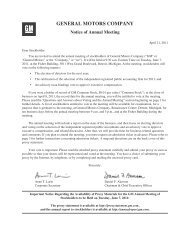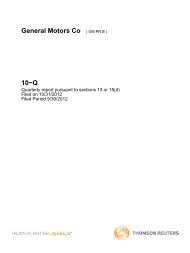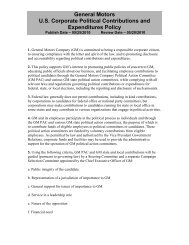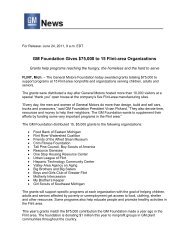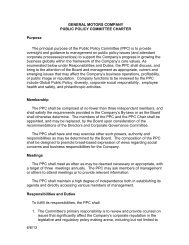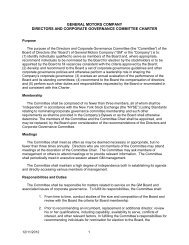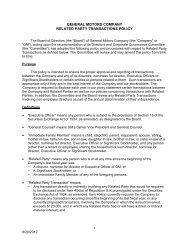Winning with Integrity (code of ethics) - General Motors
Winning with Integrity (code of ethics) - General Motors
Winning with Integrity (code of ethics) - General Motors
Create successful ePaper yourself
Turn your PDF publications into a flip-book with our unique Google optimized e-Paper software.
GM Team Members:<br />
August 2, 2011<br />
LEADERSHIIP MESSAGE<br />
<strong>Winning</strong> With <strong>Integrity</strong><br />
We’ve marked a new chapter in the history <strong>of</strong> this storied company. In addition to earning<br />
the respect and trust <strong>of</strong> the buying public <strong>with</strong> our vision to design, build and sell the world’s<br />
best vehicles, we also intend to earn the respect and trust <strong>of</strong> those who put their financial<br />
faith in us.<br />
Our progress is encouraging, but our work is far from done. We need to keep running<br />
hard and running lean to prove every single day that GM is a new and different<br />
company. Our competitors are not relaxing, and neither will we.<br />
Whether you are reading this in Shanghai or São Paulo, Dubai or Detroit, Russelsheim or<br />
any <strong>of</strong> dozens <strong>of</strong> other GM locations around the world, one thing that hasn’t changed is<br />
our steadfast commitment to doing the right thing to achieve our business objectives,<br />
through personal responsibility and accountability. <strong>Winning</strong> <strong>with</strong> <strong>Integrity</strong>, which<br />
outlines the policies and obligations that guide our business conduct, reflects this deep<br />
commitment. Please read it carefully and follow its guidance consistently.<br />
Acting <strong>with</strong> integrity is something we must live every day at GM, and the current<br />
business environment makes it more important than ever. It means honest and accurate<br />
reporting <strong>of</strong> our performance. It means careful attention to our internal controls and<br />
policies. It means understanding and complying <strong>with</strong> our legal responsibilities. And, it<br />
means competing by the rules and making sure our actions match our words.<br />
In the end, acting <strong>with</strong> integrity comes down to being accountable for how we work and<br />
conduct ourselves as GM employees. It requires a commitment by every member <strong>of</strong> the<br />
GM team, especially now. I know I can count on all <strong>of</strong> you to do your part.<br />
To succeed, we need to unite as team GM and hold ourselves, and each other, to high<br />
standards. The future <strong>of</strong> GM is ours to create. I look forward to working <strong>with</strong> you to make<br />
our company the best it can be.<br />
Dan Akerson<br />
Chairman and Chief Executive Officer<br />
2
August 2, 2011<br />
Tablle <strong>of</strong> Contents<br />
<strong>Winning</strong> With <strong>Integrity</strong><br />
LLEADERSHI IP MESSAGE ......................................................................................................... 2<br />
TTABLLE OFF CONTTENTTS ............................................................................................................. 3<br />
INTTRODUCTTI<br />
I<br />
ION ........................................................................................................................ 4<br />
Who Must Follow GM’s Code <strong>of</strong> Conduct, <strong>Winning</strong> <strong>with</strong> <strong>Integrity</strong> .......................................................................... 4<br />
Personal <strong>Integrity</strong> ..................................................................................................................... 5<br />
Understanding the Rules ...................................................................................................................................................... 5<br />
Acting With <strong>Integrity</strong> When the Rules Seem Unclear ................................................................................................... 5<br />
<strong>Integrity</strong> in the Workplace ........................................................................................................ 6<br />
Fair Treatment and Respect ................................................................................................................................................. 6<br />
Equal Employment Opportunity ......................................................................................................................................... 6<br />
Health and Safety .................................................................................................................................................................... 6<br />
Conflicts <strong>of</strong> Interest ................................................................................................................................................................ 7<br />
Accuracy <strong>of</strong> GM Information and Use <strong>of</strong> GM Property ................................................................................................. 9<br />
Litigation and Investigations ............................................................................................................................................ 12<br />
<strong>Integrity</strong> in the Marketplace ................................................................................................... 12<br />
Gifts, Entertainment, and Gratuities .............................................................................................................................. 12<br />
Fair Competition ................................................................................................................................................................... 16<br />
Insider Trading ...................................................................................................................................................................... 16<br />
<strong>Integrity</strong> in Society and Our Communities ........................................................................... 17<br />
Giving to U.S. Government Officials ............................................................................................................................... 17<br />
Avoiding Improper Payments to Non U.S. Government Officials .......................................................................... 17<br />
Export Compliance ............................................................................................................................................................... 18<br />
<strong>Integrity</strong> Toward the Environment......................................................................................... 19<br />
GM Environmental Principles ........................................................................................................................................... 19<br />
Conclusion .............................................................................................................................. 20<br />
3
August 2, 2011<br />
IINTRODUCTIION<br />
Who Must Follow GM’s Code <strong>of</strong> Conduct, <strong>Winning</strong> <strong>with</strong> <strong>Integrity</strong><br />
GM’s Code <strong>of</strong> Conduct applies to all GM salaried employees around the world.<br />
<strong>Winning</strong> With <strong>Integrity</strong><br />
Subsidiaries and Affiliates<br />
<strong>Winning</strong> <strong>with</strong> <strong>Integrity</strong> applies to all staffs, divisions, and subsidiaries <strong>of</strong> GM. For purposes <strong>of</strong> the Code, subsidiaries are<br />
companies in which GM, directly or indirectly, owns more than 50 percent <strong>of</strong> the voting stock, and exercises management<br />
control. Where GM owns less than 50 percent and does NOT exercise management control, a case-by-case determination<br />
is made.<br />
Third Party Representatives <strong>of</strong> GM<br />
Some sections <strong>of</strong> this Code apply to consultants, agents, sales representatives, distributors, independent contractors, and<br />
contract workers (collectively, “GM Representatives”) when they act on behalf <strong>of</strong> GM. GM employees who interact <strong>with</strong><br />
GM Representatives must assure that those Representatives follow the applicable requirements when they act for GM.<br />
Waivers<br />
In rare circumstances a waiver to a particular requirement stated in <strong>Winning</strong> <strong>with</strong> <strong>Integrity</strong> may be granted by The<br />
Executive Operations Committee. Waivers must be requested and granted in writing. Waivers for executive <strong>of</strong>ficers or<br />
members <strong>of</strong> our Board <strong>of</strong> Directors will not be permitted.<br />
4
August 2, 2011<br />
Personal <strong>Integrity</strong><br />
<strong>Winning</strong> With <strong>Integrity</strong><br />
Nothing is more fundamental to <strong>Winning</strong> <strong>with</strong> <strong>Integrity</strong> than taking personal responsibility for our actions. It is<br />
imperative that we all comply <strong>with</strong> the legal obligations and policies described in GM’s Code <strong>of</strong> Conduct.<br />
It is also important to voice concerns when we believe the law, or GM policies, are not being observed. <strong>General</strong> <strong>Motors</strong> is<br />
committed to maintaining a culture that promotes the prevention, detection and resolution <strong>of</strong> misconduct. Each<br />
employee has an obligation to report potential misconduct. Examples <strong>of</strong> misconduct may include fraud, theft, workplace<br />
violence, discrimination, harassment, misuse <strong>of</strong> company resources, conflicts <strong>of</strong> interest, information breaches, improper<br />
accounting controls or purchasing arrangements, and other unethical behaviors. In cases where an individual is<br />
uncomfortable reporting through established internal channels, reports can be made using the Awareline. Due to the<br />
legal requirements in Europe, see the European Awareline web page.<br />
Speak Up!, GM's Non-Retaliation Policy, is intended to protect GM employees from retaliation as a result <strong>of</strong> raising<br />
concerns in good faith. If you believe that you have been retaliated against or witnesses retaliation against another in<br />
violation <strong>of</strong> this policy, you should immediately report such concerns to your supervisor, HR contact, Legal Staff contact, or<br />
local leadership.<br />
Understanding the Rules<br />
Because laws are complex and changing, good intentions are not always enough to assure compliance. Every employee<br />
whose work is directly affected by particular laws must understand the legal rules well enough to spot problems and<br />
know when to get advice. Contact GM Legal <strong>with</strong> any questions about legal obligations that may affect your role.<br />
Acting With <strong>Integrity</strong> When the Rules Seem Unclear<br />
Not all situations are clear-cut, so good judgment is essential. Be alert to warning signs: if a questionable proposal is<br />
defended as “doing whatever it takes” or because “our competition does it” or “no one will ever know,” chances are it<br />
needs to be reconsidered.<br />
When in doubt about the right choice, ask yourself:<br />
� Is it legal?<br />
� Is it consistent <strong>with</strong> our values and policies?<br />
� Would you be willing to be accountable for your actions?<br />
DO<br />
� Take personal responsibility for performing<br />
assignments consistently <strong>with</strong> GM policies and all<br />
applicable laws and regulations.<br />
� Know the rules. Seek guidance from the Legal Staff or<br />
other subject matter experts about laws and<br />
regulations relating to your work.<br />
� Notify your leadership or the Legal Staff if you have<br />
any doubts about whether an action is legal or<br />
violates GM policies.<br />
Examples<br />
DON'T<br />
� Assume it’s acceptable to follow instructions that<br />
violate the law or GM policy.<br />
� Assume someone else will correct a problem.<br />
� Assume a questionable practice is legal just because<br />
it has been done by someone else.<br />
5
Fair Treatment and Respect<br />
August 2, 2011<br />
<strong>Integrity</strong> in the Workplace<br />
<strong>Winning</strong> With <strong>Integrity</strong><br />
We hire, promote, train, and pay based on merit, experience, or other work-related criteria. We value the wide range <strong>of</strong><br />
backgrounds <strong>of</strong> our employees. Our diversity is a strength in the increasingly diverse marketplace. And we strive to<br />
create work environments that accept and tolerate differences while promoting productivity and teamwork. Each <strong>of</strong> us is<br />
responsible for creating and maintaining a productive work environment where the dignity <strong>of</strong> all employees is respected.<br />
Examples<br />
Equal Employment Opportunity<br />
GM is committed to equal employment opportunity. GM extends employment opportunities to all qualified applicants<br />
and employees and strives to maintain workplace environments free <strong>of</strong> discrimination, hostility and physical or verbal<br />
harassment <strong>with</strong> respect to age, race, color, sex, religion, national origin, disability, sexual orientation, gender<br />
identity/expression, or being a disabled veteran, a veteran <strong>of</strong> the Vietnam Era, or other covered veterans.<br />
GM employees are entitled to a work environment free from conduct that even appears disrespectful. Certain jokes,<br />
cartoons, pictures, language, gestures, and touching may <strong>of</strong>fend people and may result in a hostile work environment,<br />
which GM does not tolerate.<br />
Health and Safety<br />
GM’s overriding priority is to protect the health and safety <strong>of</strong> each employee. We all have a stake in a healthy, injury-free<br />
work environment that protects the health and safety <strong>of</strong> each employee. We should not compromise any person’s wellbeing<br />
in anything we do.<br />
This means following procedures for reducing accident risks, and it means using equipment safely. It means following<br />
safe workplace practices � no exceptions, no shortcuts. It means promptly voicing safety concerns to supervisors, so we<br />
can correct situations that may endanger employees. Don’t assume that a safety hazard has been reported - take<br />
responsibility for reporting it yourself.<br />
GM encourages employees to continue safe practices outside <strong>of</strong> the <strong>of</strong>fice, such as following safe driving practices:<br />
wearing your seatbelt; avoiding distractions (cell phones and texting); not driving while impaired; and obeying traffic laws<br />
and speed limits.<br />
For more information on GM’s Health and Safety policies, please visit the Global Health and Safety website.<br />
DO<br />
� Always treat fellow employees <strong>with</strong> dignity and<br />
respect.<br />
� Always observe safety protocols.<br />
� Base personnel decisions on merit.<br />
� If you must use a phone while driving, use hands<br />
free devices when driving.<br />
DON’T<br />
� Demean any person or group.<br />
� Tolerate behavior that fails to meet GM standards <strong>of</strong><br />
fairness or respect.<br />
� Take shortcuts that expose anyone to a risk <strong>of</strong> injury.<br />
� Assume someone else has responsibility to identify<br />
or correct problems.<br />
6
Conflicts <strong>of</strong> Interest<br />
August 2, 2011<br />
<strong>Winning</strong> With <strong>Integrity</strong><br />
GM employees have a duty to act solely in the best interests <strong>of</strong> GM and to provide GM <strong>with</strong> our individual loyalty. Avoid<br />
any activity, investment, or interest that might hurt or reflect badly on GM. The appearance <strong>of</strong> a conflict can be just as<br />
damaging as an actual conflict <strong>of</strong> interest.<br />
Examples <strong>of</strong> potential conflicts <strong>of</strong> interest include:<br />
� Investing in a supplier, dealer, customer, or competitor;<br />
� Having close family members who work for suppliers, dealers, customers, or competitors; and<br />
� Employment outside GM <strong>with</strong>out leadership approval.<br />
If our duties include contact <strong>with</strong> an organization that employs a relative, former colleague, or someone <strong>with</strong> whom we<br />
have a significant personal relationship, including a romantic or sexual relationship, we should take precautions to avoid a<br />
potential conflict <strong>of</strong> interest or even the appearance <strong>of</strong> preferential treatment. The organization should receive no<br />
advantage or disadvantage because <strong>of</strong> the personal relationship. When presented <strong>with</strong> such situations, consult <strong>with</strong><br />
leadership and, if necessary, step down from acting on behalf <strong>of</strong> GM.<br />
Hiring and promotions must not be influenced by a candidate’s relationship to any employee, including family, personal,<br />
romantic, or sexual relationships. If people <strong>with</strong> such ties are hired or assigned, steps should be taken to avoid any<br />
reporting relationship, either direct or indirect, between them. On rare occasions, leadership senior to both <strong>of</strong> the<br />
affected employees may permit a reporting relationship between employees <strong>with</strong> such ties. Such cases should be<br />
reviewed <strong>with</strong> GM’s Global Ethics and Compliance Center to ensure no conflict <strong>of</strong> interest exists in this regard.<br />
Use the GM Conflict <strong>of</strong> Interest Questionnaire to disclose those relationships and any other actual or potential conflict <strong>of</strong><br />
interest. Disclosure lets leaders decide whether an actual conflict exists and how to address it if one does exist.<br />
GM employees have an ongoing obligation to supplement their Conflict <strong>of</strong> Interest Questionnaire to ensure that they<br />
disclose any change in circumstance covered by the Questionnaire. In the event such a change occurs, employees should<br />
promptly update their conflict <strong>of</strong> interest disclosure <strong>with</strong>in 30 days by going to the <strong>Winning</strong> <strong>with</strong> <strong>Integrity</strong> website.<br />
Interests in Other Businesses<br />
Use the GM Conflict <strong>of</strong> Interest Questionnaire to disclose certain financial stakes, called a “Material Interest,” in a supplier,<br />
customer, competitor, etc. For a detailed definition <strong>of</strong> the type <strong>of</strong> financial stake that must be disclosed, please refer to<br />
the Conflict <strong>of</strong> Interest Policy. This policy does not apply to investments and interests in publicly owned mutual funds and<br />
trusts, or personal loans from banks, insurance, and finance companies in the regular course <strong>of</strong> business. Employees who<br />
deal <strong>with</strong> banks or other financial institutions in the course <strong>of</strong> their GM employment should not improperly obtain loans<br />
from such organizations.<br />
Supplier Relationships<br />
GM selects suppliers impartially on the basis <strong>of</strong> quality, service, technology and price. <strong>General</strong> <strong>Motors</strong>' policy is that<br />
former executive and classified employees (retirees or those separated for any reason) who occupied positions prior to<br />
termination in which they could influence purchasing decisions should not be received as a representative <strong>of</strong> a supplier by<br />
their former employing division or staff for a period <strong>of</strong> two years following their separation. Any exceptions or deviations<br />
must be approved and documented by the Director <strong>of</strong> Human Resources for the functional area in which the employee<br />
worked prior to separation.<br />
With respect to former employees calling on divisions or staffs other than their former employing division or staff, the<br />
Director <strong>of</strong> Human Resources for the functional area in which the employee worked prior to separation and the Director<br />
<strong>of</strong> Human Resources <strong>of</strong> the functional area the former employee is calling on should be contacted to determine whether<br />
the former employee's dealing could be considered sufficient to influence, or perceived as influencing, the purchasing<br />
decision and therefore necessitate the imposition <strong>of</strong> the two year restriction.<br />
7
<strong>Winning</strong> With <strong>Integrity</strong><br />
In either situation, <strong>with</strong> respect to all former executive employees <strong>with</strong> outstanding incentive awards, the Executive<br />
Director - Global Compensation and Corporate Governance should be contacted prior to approval <strong>of</strong> any such assignment.<br />
Please see the Global Human Resources Policy for additional information.<br />
Charitable Activities and Public Service<br />
GM applauds service to charities, schools, pr<strong>of</strong>essional organizations, and governmental bodies or advisory groups. Only<br />
rarely do conflicts arise from such service. Be alert to that potential and to the time demands <strong>of</strong> the position and take the<br />
precaution <strong>of</strong> identifying the organization(s) on your Conflict <strong>of</strong> Interest Questionnaire. When soliciting donations for an<br />
outside organization, avoid any impression <strong>of</strong> pressure by GM. Donations must be purely voluntary. And do not use GM<br />
letterhead on any solicitation unless GM supports the fundraising as a corporate activity.<br />
Outside Employment<br />
We are expected to devote full time to our work during regular hours and for whatever additional time may be required.<br />
Outside employment can create conflicts <strong>of</strong> interest or reduce productivity. Avoid outside business activities that divert<br />
time and attention from GM business. And if any outside activity involves compensation, disclose it to leadership, and on<br />
the GM Conflict <strong>of</strong> Interest Questionnaire.<br />
GM discourages employees from joining boards <strong>of</strong> outside for-pr<strong>of</strong>it companies. Employees may serve on such a board<br />
only <strong>with</strong> prior leadership approval obtained pursuant to The Employees Serving on Outside Boards <strong>of</strong> Directors<br />
subsection <strong>of</strong> the Global Human Resources Corporate Policy.<br />
Never accept any employment by a supplier, customer, dealer, or competitor <strong>of</strong> GM. When an employee’s spouse or<br />
partner works for a supplier, customer or competitor, both individuals need to take care to comply <strong>with</strong> the duty each<br />
owes to his or her employer.<br />
August 2, 2011<br />
DO<br />
� Each year all employees should examine their personal<br />
circumstances as they relate to the Conflict <strong>of</strong> Interest questions<br />
to determine if they need to update their disclosure.<br />
� Use the GM Conflict <strong>of</strong> Interest Questionnaire to notify<br />
leadership <strong>of</strong> any potential conflict - even if you think it probably<br />
isn’t a problem.<br />
� Fully disclose any activity, investment, employment or<br />
relationship that could create even the appearance <strong>of</strong> a<br />
possible conflict.<br />
� Consult the Conflict <strong>of</strong> Interest Policy for advice on how to<br />
answer each question.<br />
� Keep a copy <strong>of</strong> the completed Conflict <strong>of</strong> Interest Questionnaire<br />
for your own files.<br />
� Update your disclosure <strong>with</strong>in 30 days, any time circumstances<br />
covered by the Questionnaire change.<br />
Examples<br />
DON’T<br />
� Become involved in any activity,<br />
investment, employment, or<br />
other relationship that could<br />
create a conflict <strong>with</strong> GM<br />
employment.<br />
� Fail to notify leadership <strong>with</strong> full<br />
disclosure <strong>of</strong> any activities that<br />
could create a conflict or<br />
promptly update your<br />
questionnaire if your<br />
circumstances change.<br />
� Send paper copies <strong>of</strong> the Conflict<br />
<strong>of</strong> Interest Questionnaire<br />
8
Accuracy <strong>of</strong> GM Information and Use <strong>of</strong> GM Property<br />
August 2, 2011<br />
<strong>Winning</strong> With <strong>Integrity</strong><br />
Employees have an obligation to protect GM’s assets and ensure their proper use. GM’s assets include not only financial<br />
assets but also plants and equipment, inventory, supplies, information, and information technology. GM assets should<br />
be used only for GM business, and in accordance <strong>with</strong> applicable GM rules.<br />
Submitting false expense reports is a clear example <strong>of</strong> misappropriating GM assets. So is copying GM-supplied s<strong>of</strong>tware<br />
for personal use.<br />
Accurate Information, Records, and Communications<br />
Intentionally creating or inserting false or misleading information in any GM financial or other business record is strictly<br />
prohibited. Inaccurate information leads to bad decisions by GM. And our customers, suppliers, investors, business<br />
partners, communities, and government <strong>of</strong>ficials rely on us for accurate information.<br />
All business records are to be maintained accurately. Whenever an inaccuracy finds its way into a record, it should be<br />
corrected and, where appropriate, the reasons for the correction should be noted. This is also important in engineering<br />
records. An inaccurate record is an “open loop.” We need to “close the loop” by clarifying and supplementing the “open<br />
loop” record <strong>with</strong> the accurate data or judgment.<br />
We must also ensure that GM’s business records are available to meet the company’s business needs, including legal and<br />
tax requirements. That’s why we must comply <strong>with</strong> GM’s Information LifeCycle Management (ILM) policies in creating,<br />
managing, and disposing <strong>of</strong> all GM records. Be alert to and observe Litigation Holds. These are instructions from the<br />
Legal Staff requiring that certain records be retained beyond normal retention periods for legal or compliance reasons.<br />
Failure to comply <strong>with</strong> Litigation Holds can result in serious harm to GM and its employees. It is unlawful to destroy,<br />
conceal, alter, or falsify any GM business or other record, document, or object for the purpose <strong>of</strong> obstructing or<br />
influencing any lawsuit or other legal or governmental proceeding or investigation.<br />
The GM Information Security Policy and Practices provide guidance on the classification and protection <strong>of</strong> GM<br />
information. The GM ILM policies provide guidance on creating, maintaining, and disposing <strong>of</strong> all GM records containing<br />
GM information, and for the Acceptable Use Practices that govern use <strong>of</strong> GM information resources. These policies also<br />
apply to those third parties, including contract workers, who have access to GM information. Each <strong>of</strong> us must learn and<br />
comply <strong>with</strong> GM Information Security and Information LifeCycle Management policies and Acceptable Use Practices<br />
applicable to our jobs. This includes everything from securing workstations, to keeping passwords secret, and much more.<br />
Use <strong>of</strong> Corporate Property<br />
GM assets should not be used for personal purposes. Of course, there are situations where infrequent and limited<br />
personal use is permissible). Talk <strong>with</strong> your leader if you are not sure the use is appropriate.<br />
Company Vehicles<br />
Employees may use GM-owned vehicles only as authorized by management. Employees must operate GM-owned<br />
vehicles lawfully and must comply <strong>with</strong> GM policies applicable to company vehicles in the location where the vehicle is<br />
operated.<br />
9
Internet/Email and Voice Mail<br />
August 2, 2011<br />
<strong>Winning</strong> With <strong>Integrity</strong><br />
As a rule, use the Internet only for work assignments. Nominal personal use is permitted if it does not interfere <strong>with</strong> work<br />
or productivity, and does not conflict <strong>with</strong> directions from local leadership or <strong>with</strong> GM’s Acceptable Use Practices. If in<br />
doubt, ask your leaders.<br />
All messages transmitted on GM’s Email and voice mail systems become GM records, and no employee should expect that<br />
they will be treated as personal or private messages. GM can, and sometimes does, access or monitor its Email and VME<br />
systems for legitimate business reasons, and may delete any Email or VME messages, or disclose them to others, <strong>with</strong>out<br />
advance notice, unless applicable law provides differently.<br />
Use <strong>of</strong> Social Media<br />
You are the face <strong>of</strong> the Company, and what you publish reflects on GM and our brands. GM’s Social Media Policy sets<br />
forth requirements you must follow, whether you are interacting personally or as an authorized GM spokesperson.<br />
Following are some guidelines all GM employees should remember when using social media. For more details, please<br />
refer to the GM Employee and Representative Social Media Policy.<br />
Be Honest About Who You Are<br />
Transparency is important in social media. Posting anonymously online should be avoided. You need to disclose that you<br />
work for or <strong>with</strong> GM whenever you participate in these discussions.<br />
Be Clear That The Views You Are Expressing Are Your Own<br />
Only persons who have been authorized to be an <strong>of</strong>ficial Social Media Spokesperson can speak on behalf <strong>of</strong> GM in an<br />
<strong>of</strong>ficial capacity. Make sure that, even when you have identified yourself as working for GM (including on your social<br />
media pr<strong>of</strong>iles like Twitter, LinkedIn or Facebook), you are clear that your views and opinions are your own and not those<br />
<strong>of</strong> the Company. If you think an “<strong>of</strong>ficial” GM response may be required, contact GM Social Media at<br />
socialmediateam@gm.com.<br />
Use Good Judgment About What You Share And How You Share It<br />
Be honest, truthful and appropriate to the medium. You are personally responsible for your words, and actions, both<br />
online and <strong>of</strong>fline. Your posts can potentially tarnish the image, damage the reputation or infringe on the rights <strong>of</strong><br />
someone else (including GM and its employees). Even comments about a local topic can spread around the globe in an<br />
instant.<br />
Treat Everyone With Respect<br />
Remember that customers, colleagues, supervisors, suppliers and competitors may have access to whatever you post.<br />
These individuals reflect a diverse set <strong>of</strong> customs, values and viewpoints. Offensive, demeaning, abusive or inappropriate<br />
remarks are as out-<strong>of</strong>-place online as they are <strong>of</strong>fline. You are expected to abide by the same standards <strong>of</strong> behavior both<br />
in the workplace and in your social media communications.<br />
Be Aware That Your Online Communications Travel Fast, Remain Forever And Are Usually NOT “Private”<br />
There are no secrets on the Internet. Information you may think you have protected as “private” on some social media<br />
sites may be accessed by others. Make sure you will have no regrets about what you said or did online if a reporter, a<br />
relative or your manager were to view it.<br />
If you are still unclear what actions are considered to be a violation <strong>of</strong> GM policy, please refer to the Social Media Policy.<br />
Whether you are using email, voice mail, or social media channels, never make any illegal, unethical, unauthorized, or<br />
disruptive use <strong>of</strong> GM information systems or equipment. This includes, for example, accessing, transmitting, or storing<br />
inappropriate material (e.g., pornography, depicted nudity, lewd or violent materials, chain letters, sexually oriented<br />
10
<strong>Winning</strong> With <strong>Integrity</strong><br />
jokes or cartoons, or other <strong>of</strong>fensive/demeaning material related to age, race, color, sex, religion, national origin,<br />
disability, or sexual orientation). Violations will subject you to disciplinary action up to and including discharge.<br />
If you get an inappropriate message, or are confronted <strong>with</strong> instances <strong>of</strong> unethical business practices or<br />
behavior, report it to your leader, or contact the Awareline.<br />
Communicating <strong>with</strong> the Media<br />
The GM Communications Staff is responsible for all communications <strong>with</strong> the press or the media related to GM business<br />
by GM and by all GM employees, globally. The rule to follow here is simple. Unless approved by an appropriate member<br />
<strong>of</strong> GM Communications, you are not authorized to speak <strong>with</strong> any representative <strong>of</strong> the press or media regarding GM<br />
business. If a media representative contacts you, do not answer any questions or make any statements. You should direct<br />
them to GM Communications, and immediately notify your leader and your business unit's Communications<br />
representative <strong>of</strong> the contact. Failure to follow this simple rule can result in disciplinary action up to and including<br />
discharge.<br />
Protecting GM Information<br />
Each employee has an obligation to protect information we may receive, acquire, develop or record in performing our<br />
jobs. This is not optional – it is absolutely critical that we diligently protect company information.<br />
What does this mean?<br />
�� Only access information you need and are authorized to view.<br />
�� Communicate confidential information only to GM employees and authorized agents (such as attorneys,<br />
auditors, accountants) who have a legitimate business reason to know the information.<br />
�� Do not display, review or discuss GM information in public places, <strong>with</strong> third parties or in areas where others<br />
may hear you.<br />
�� Do not email GM information to your personal email account or otherwise remove information from GM,<br />
whether in hard copy or using any form <strong>of</strong> media device to record.<br />
�� Never disclose GM information <strong>with</strong>out the prior approval <strong>of</strong> senior management from the unit responsible for<br />
the GM information.<br />
Information may include product plans, vehicle designs, strategy documents, communications to and from GM<br />
management and the Board <strong>of</strong> Directors, prospective business opportunities, pricing information, financial or technical<br />
data or a planned meeting between a GM leader and an outside party.<br />
All GM information belongs to GM, not to GM employees, regardless <strong>of</strong> the nature, medium or form <strong>of</strong> the information.<br />
Your ongoing obligation to protect GM information continues even if you leave GM. You must return all information in<br />
your possession or control if you leave, and if requested, sign a statement confirming your compliance <strong>with</strong> respect to the<br />
information. Also, do not bring any confidential information from a previous employer to GM, unless there is an<br />
agreement otherwise executed by your previous employer and GM. The company will take whatever steps are necessary<br />
to ensure GM information is protected.<br />
Personal Information and Privacy Concerns<br />
GM recognizes the importance <strong>of</strong> safeguarding personal information. Personal information must be treated in<br />
accordance <strong>with</strong> the privacy-related policies, acceptable use practices, and other requirements found at Global Privacy<br />
Center. When security breaches related to personal information occur, they must be promptly reported through Global<br />
Reporting Incident Tracking (GRIT) or other procedures established in the Personal Information Security Incident Process.<br />
For more information please visit the Global Privacy Center website.<br />
August 2, 2011<br />
11
Litigation and Investigations<br />
August 2, 2011<br />
<strong>Winning</strong> With <strong>Integrity</strong><br />
Litigation is a fact <strong>of</strong> life. Requests for documents in various forms (paper, E-mail, etc.) related to litigation and other legal<br />
proceedings normally flow through channels set up for that purpose, but there may be times when other employees<br />
receive them. Consult immediately <strong>with</strong> the Legal Staff if, as a representative <strong>of</strong> GM, you receive any summons,<br />
subpoena, inquiry, or other communication from a court, marshal, sheriff, government agent, or from any lawyer. Before<br />
submitting to an interview, answering any questions, producing any documents, or even responding to any questions<br />
about litigation or an investigation, consult <strong>with</strong> the Legal Staff. This applies to matters in which GM is involved directly,<br />
like an investigation or a lawsuit involving a GM product or a GM facility. It also applies to matters in which GM is<br />
involved indirectly, including investigations <strong>of</strong> suppliers, dealers, or competitors.<br />
DO<br />
� Know and comply <strong>with</strong> the GM Information<br />
Security Policy and Practices and Information<br />
LifeCycle Management Policies.<br />
� Treat all GM information and property as valuable<br />
business assets belonging to someone else - GM’s<br />
stockholders.<br />
� Make sure communications are accurate - whether<br />
internal or external.<br />
� Comply <strong>with</strong> all applicable laws and regulations,<br />
and GM’s Acceptable Use Practices governing the<br />
use <strong>of</strong> GM information resources such as<br />
computers, s<strong>of</strong>tware, E-mail, the Internet and<br />
intranet (Socrates).<br />
Examples<br />
Gifts, Entertainment, and Gratuities<br />
DON’T<br />
� Ignore security procedures to save time.<br />
� Give access to GM information to anyone not<br />
authorized to have it.<br />
� Use GM property or systems for your own personal<br />
pr<strong>of</strong>it or gain, or for political activity.<br />
� Create or knowingly process misleading or<br />
inaccurate information about GM business.<br />
� Use GM information resources to create, access,<br />
transmit, or store any material that is in bad taste,<br />
<strong>of</strong>fensive, disrespectful <strong>of</strong> others, or otherwise<br />
inappropriate.<br />
� Do anything that would disrupt or compromise the<br />
availability, integrity, or security <strong>of</strong> GM information,<br />
information resources, or other GM property.<br />
<strong>Integrity</strong> in the Marketplace<br />
Gifts, gratuities, and entertainment are courtesies <strong>of</strong>ten designed to build relationships. In a business setting, however,<br />
ethical problems can arise when these items compromise, or appear to compromise our ability to make impartial,<br />
objective and fair business decisions. The following is intended to guide our judgment when confronted <strong>with</strong><br />
opportunities to accept or give certain gifts, gratuities or entertainment from, or to suppliers, dealers, customers or other<br />
third parties.<br />
Receiving From Suppliers<br />
GM must make purchasing decisions solely based on a supplier’s quality, service, technology and price. Avoid doing<br />
anything that suggests our purchasing decisions may be influenced by any irrelevant consideration, whether illegal (such<br />
as a kickback or bribe) or improper (such as personal friendship, gifts, or entertainment).<br />
12
<strong>Winning</strong> With <strong>Integrity</strong><br />
Inexpensive gifts or mementos, such as “logo” pens, cups, or caps, may be accepted unless your business unit forbids<br />
them. And there may also be rare circumstances where refusing a gift could be against GM’s legitimate interests, as in<br />
countries outside the U.S. where gift-giving is an expected courtesy and is not intended to corrupt a particular purchase<br />
decision. When there is a legitimate business reason to accept a gift <strong>of</strong> any significant value, remember that the item<br />
becomes the property <strong>of</strong> GM. Turn it over to your leadership for use, display, or other disposition.<br />
With prior leadership approval, employees may attend activities where attendance will benefit GM, such as by enhancing<br />
job performance or pr<strong>of</strong>essional development. These may include supplier-sponsored events, including receptions at<br />
industry conferences such as the SAE (Society <strong>of</strong> Automotive Engineers) and trade shows. As always, use good judgment.<br />
Avoid being a guest at any conference event where the hospitality is provided exclusively to you, such as a private dinner,<br />
as contrasted to an open reception for all conference participants. Never solicit tickets from suppliers. With prior<br />
leadership approval, you may accept tickets to industry events, such as the SAE or auto shows, but normally you should<br />
reimburse the supplier for the fair value <strong>of</strong> the tickets at your personal expense. Or, if attendance is a legitimate businessrelated<br />
activity, you should submit an expense report for reimbursement. If the fair value <strong>of</strong> tickets is hard to determine,<br />
decline them.<br />
Employees may, depending on circumstances, be guests at a meal hosted by a supplier. In deciding whether to<br />
participate, employees should consider the context, including whether companies besides GM are participating, and<br />
whether the event would be considered “lavish”. Examples <strong>of</strong> entertainment which should be declined would be golf<br />
outings following a business meeting, accommodation costs for a supplier-sponsored event, and tickets to sporting events<br />
or artistic performances. Any such costs should be paid fully by the employee or, in rare circumstances, should be<br />
approved in advance by leadership as a business expense.<br />
It is permissible to conduct business <strong>with</strong> a supplier over a meal, if you pay for the meal whenever feasible (such as<br />
splitting a restaurant tab). On a rare and exceptional basis, it may be most practical to accept a meal from a supplier; as<br />
when there is no restaurant tab to split. The meal should be inexpensive and there must be a genuine need to discuss<br />
business matters at the meal. If your business unit has a more stringent policy, you must follow it.<br />
At times, suppliers sponsor charity events and invite GM employees to be their guests. GM encourages corporate<br />
philanthropy, and it is permissible to attend such events. But when the supplier pays for the ticket, the GM employee<br />
should make a personal contribution to the charity at the level <strong>of</strong> an individual donor so the employee is not attending<br />
solely because <strong>of</strong> the supplier’s generosity.<br />
As a general rule, discuss <strong>with</strong> your leadership how to handle questionable situations. GM’s goal is to avoid even the<br />
appearance <strong>of</strong> impropriety. Our procurement processes must actually be - and must appear to be - based solely on the<br />
quality, service, technology and pricing <strong>of</strong> our suppliers. In the final analysis, your good judgment and disclosure are the<br />
keys to protecting GM’s reputation as a company that conducts business <strong>with</strong> integrity.<br />
Receiving From Others<br />
What about gifts, entertainment, or other gratuities <strong>of</strong>fered by non-suppliers, including customers, government <strong>of</strong>ficials,<br />
industry groups, civic organizations, charities, and others? Always use good judgment and be sensitive to appearances<br />
that anything <strong>of</strong>fered by a non-supplier may undermine the integrity <strong>of</strong> our business decisions. Here is some guidance for<br />
particular situations.<br />
Gifts, entertainment, or other gratuities from anyone who may seek to influence GM’s decisions should be politely<br />
declined, as <strong>with</strong> suppliers. Examples <strong>of</strong> decisions that might be improperly influenced include vehicle allocation,<br />
extension <strong>of</strong> credit, location <strong>of</strong> facilities, or charitable donations. Sometimes very inexpensive gifts or refreshment may<br />
be appropriate to accept. Examples include recognition awards for community service or non-monetary gratuities for<br />
speaking appearances.<br />
August 2, 2011<br />
13
<strong>Winning</strong> With <strong>Integrity</strong><br />
Modest entertainment <strong>of</strong>fered by a non-supplier may be accepted if it is infrequent and creates no sense <strong>of</strong> obligation to<br />
the host. But we should pay our own way for meals and for such entertainment as a sporting or theater event, golf round,<br />
or concert. At a recognition or awards dinner, it may not be appropriate to pay for our own meal, and there could be<br />
refreshments or working meals served at meetings where it may be awkward to reimburse the host organization. Gifts<br />
(other than non-monetary awards recognizing individual accomplishments) to GM employees, arising out <strong>of</strong> their GM<br />
employment, are the property <strong>of</strong> GM and should be turned over to the Company promptly.<br />
Do not accept a gift, entertainment, or other gratuity from a government or union <strong>of</strong>ficial, <strong>with</strong> the exception <strong>of</strong> “<strong>of</strong>ficial”<br />
gifts, entertainment, or other gratuities from a country representative to a GM representative.<br />
August 2, 2011<br />
14
Giving to Customers, Suppliers, Media, Financial Analysts<br />
August 2, 2011<br />
<strong>Winning</strong> With <strong>Integrity</strong><br />
If our customers discourage or forbid the receipt <strong>of</strong> gifts, entertainment, or other gratuities by their employees, GM’s<br />
employees are expected to respect those policies. Some forms <strong>of</strong> GM-sponsored entertainment are clearly appropriate to<br />
promote enthusiasm and teamwork as, for example, in our dealer networks. And modest entertainment <strong>of</strong> GM<br />
customers may help GM compete on a “level playing field” <strong>with</strong> our competitors.<br />
GM may sponsor media events, expositions, conferences, etc., and invite suppliers, the media, and financial analysts. Even<br />
in these limited situations, no gift, entertainment, or other gratuity should be <strong>of</strong>fered unless the following requirements<br />
are met:<br />
1. It is legal;<br />
2. The recipient’s policies permit acceptance;<br />
3. It is in GM’s legitimate business interest to do so;<br />
4. It is appropriate given local business customs;<br />
5. It is done infrequently; and<br />
6. It complies <strong>with</strong> GM’s Expense Policy<br />
Exercise good judgment in selecting a gift on those few occasions when a gift may be appropriate. Some items are<br />
inappropriate. These include cash, services, product or service discounts (other than as part <strong>of</strong> an approved GM program),<br />
loans, or co-signature arrangements. Alcoholic beverages are not to be given as gifts in the U.S. and may be given<br />
elsewhere only if other gifts would be considered inappropriate under local custom (and if the other elements <strong>of</strong> this<br />
policy are met).<br />
In summary, giving a gift, providing entertainment, or <strong>of</strong>fering a gratuity should be done sparingly and never to<br />
improperly influence the potential recipient’s decision.<br />
Giving to Union Representatives<br />
Never provide gifts, entertainment, or other gratuities to a union representative <strong>with</strong>out first consulting <strong>with</strong> the Legal<br />
Staff.<br />
Examples<br />
15
Fair Competition<br />
<strong>General</strong><br />
August 2, 2011<br />
<strong>Winning</strong> With <strong>Integrity</strong><br />
GM is committed to competing <strong>with</strong>in the law. This section discusses the laws that protect or regulate the competitive<br />
process. Those laws can be complicated, and they vary from country to country. So, when in doubt, consult the Legal<br />
Staff.<br />
Relations With Competitors<br />
One rule is crystal-clear: Never agree <strong>with</strong> a competitor on any element <strong>of</strong> price (including, for example, discounts,<br />
rebates, or incentives) or on what products to develop or to whom we sell. And "agree” doesn’t necessarily mean having a<br />
written contract. Courts sometimes find an illegal agreement based on a conversation, even if the conversation occurred<br />
on the golf course.<br />
� Benchmarking <strong>with</strong> a competitor may be risky, so get legal and business approval before doing it.<br />
� Competitive analysis is vital to GM, but don’t exchange competitive information directly <strong>with</strong> competitors.<br />
Customers, suppliers, or experts may be able to provide marketplace intelligence.<br />
� Avoid discussing sensitive topics like price, costs, or marketing plans at trade association meetings.<br />
For more information on GM policy relating to communicating <strong>with</strong> competitors, please refer to the Competition<br />
Law Policy found on the Global Policy Manual website.<br />
Relations With Dealers, Distributors, and Resellers<br />
It is against GM policy, and illegal in most countries, to force any dealer, distributor, or retailer to sell at a particular price.<br />
We can set a suggested retail price, but each dealer must remain free to set the sale price <strong>with</strong> customers. Consult the<br />
Legal Staff if you have questions about a non-price restriction.<br />
International Consideration<br />
U.S. antitrust laws apply to activity that hurts the competitive process in the U.S. So actions by GM subsidiaries around<br />
the world could be challenged by U.S. authorities. Most countries around the world also have their own competition<br />
laws.<br />
Examples<br />
Insider Trading<br />
In the course <strong>of</strong> our work, we may acquire important information about GM or other companies, which has not yet<br />
become publicly available. Never trade in GM securities or those <strong>of</strong> any other company while in possession <strong>of</strong> material,<br />
nonpublic information. Material information is any information that an investor would reasonably consider important in<br />
making investment decisions. Examples include knowledge <strong>of</strong> acquisitions or divestitures, new product launches,<br />
financial information, production schedules, or management changes.<br />
If you learn something that could reasonably be expected to affect the price <strong>of</strong> GM stock (or the stock <strong>of</strong> another<br />
company), do not buy or sell the stock – or disclose the information to others – until the information has been released to<br />
the public.<br />
16
For any questions on GM’s Insider Trading policy, contact the Legal Staff.<br />
August 2, 2011<br />
DO<br />
� Consider whether you have material nonpublic<br />
information about GM or any other company<br />
before trading in its securities.<br />
Examples<br />
Giving to U.S. Government Officials<br />
<strong>Winning</strong> With <strong>Integrity</strong><br />
DON’T<br />
� Share material nonpublic information about any<br />
company <strong>with</strong> anyone who might trade that<br />
company’s securities.<br />
� Assume insider trading rules only apply to trading in<br />
GM stock.<br />
<strong>Integrity</strong> in Society and Our Communities<br />
Never provide gifts, entertainment, or other gratuities to a U.S. government <strong>of</strong>ficial <strong>with</strong>out first consulting <strong>with</strong> the<br />
Legal Staff. Examples include a vehicle discount, a drink, a meal, or an invitation to a charity, sporting or other event.<br />
Something may have value even if it entails minimal or no cost to the Company or the employee in providing the product<br />
or service. A federal, state or local government <strong>of</strong>ficial, and GM and its employees, may be subject to strict penalties if it<br />
is determined that an improper gift has been given. If you believe that you may have provided an improper gift to a<br />
government <strong>of</strong>ficial, it is important that you contact the Legal Staff immediately.<br />
Avoiding Improper Payments to Non U.S. Government Officials<br />
Never provide gifts, entertainment, or other gratuities to any foreign government <strong>of</strong>ficial <strong>with</strong>out first consulting <strong>with</strong><br />
the Legal Staff. To do so could expose GM and the employee to severe consequences. U.S. law and the laws in many<br />
countries where we do business, in addition to GM policy, strictly prohibit giving anything <strong>of</strong> value to employees or<br />
representatives <strong>of</strong> foreign governments or governmental agencies, political parties, or political candidates to influence a<br />
foreign <strong>of</strong>ficial in the performance <strong>of</strong> <strong>of</strong>ficial duties, even if it may be seen as “customary” in some countries. GM’s anticorruption<br />
policy applies to everyone employed by or representing GM and its controlled affiliates, including agents and<br />
consultants, whether in the U.S. or outside the U.S.<br />
For additional information about requirements in this area, please visit the following website Global Compliance &<br />
Special Investigations Process.<br />
DO<br />
� Consult <strong>with</strong> the Legal Staff to understand GM’s anticorruption<br />
requirements.<br />
� Contact management or Legal Staff if a government<br />
<strong>of</strong>ficial solicits something <strong>of</strong> value.<br />
� Make sure, before hiring a representative to arrange<br />
business for GM, that the representative is informed<br />
about U.S. law and GM policy restrictions on<br />
payments to foreign <strong>of</strong>ficials.<br />
Examples<br />
DON’T<br />
� Give or promise anything <strong>of</strong> value to a government<br />
<strong>of</strong>ficial <strong>with</strong>out the prior approval <strong>of</strong> your leadership<br />
and the Legal Staff.<br />
� Assume a practice is acceptable because another<br />
large company reportedly has done it.<br />
� Assume a potential representative or agent will know<br />
the law or GM expectations in this area – discuss it<br />
before entering a relationship.<br />
17
Export Compliance<br />
<strong>General</strong><br />
August 2, 2011<br />
<strong>Winning</strong> With <strong>Integrity</strong><br />
Several U.S. laws and regulations govern how we conduct certain transactions <strong>with</strong> foreign countries and specific parties.<br />
These laws apply not only to U.S. operations, but also to U.S. persons, wherever located, and products manufactured<br />
around the world using U.S. -origin parts or technology. Other countries have similar laws.<br />
Export Controls<br />
The law requires an export license before certain categories <strong>of</strong> products or data can be exported or re-exported. “Export”<br />
means not only shipping an item outside the country, but also sharing data <strong>with</strong> a foreign person inside the country.<br />
Examples <strong>of</strong> products requiring export licenses are numerically controlled machines, night vision equipment, computers,<br />
military products, s<strong>of</strong>tware, and related technical data.<br />
If you have knowledge, or even suspicion, that a transaction may involve a violation <strong>of</strong> export regulations, immediately<br />
report it to the GM Office <strong>of</strong> Export Compliance or your business unit Export Compliance Officer. Be alert to a “red flag”<br />
indicating that a transaction may not be what it seems. For example, the product’s characteristics may not fit the buyer’s<br />
business, or the buyer may be reluctant to <strong>of</strong>fer information about the product’s intended end use. When in doubt, don’t<br />
enter into the transaction.<br />
Foreign Asset Controls<br />
Foreign asset controls are economic sanctions or embargoes the U.S. places on certain countries or groups to motivate<br />
them to change certain practices. These controls apply to U.S. citizens, residents and companies, and sometimes to<br />
international subsidiaries <strong>of</strong> U.S. companies. The rules vary, but they tend to be broad.<br />
Employees must get guidance from the GM Office <strong>of</strong> Export Compliance before dealing <strong>with</strong> a sanctioned country or<br />
entity. Currently, the U.S. has imposed broad based sanctions against Cuba, Iran, North Korea, Sudan and Syria. A<br />
complete list <strong>of</strong> sanctioned countries and entities can be found at GM Office <strong>of</strong> Export Compliance under Embargoed<br />
Countries.<br />
Anti-boycott Regulations<br />
U.S. anti-boycott laws and regulations prohibit participating in foreign boycotts that are unsanctioned by the United<br />
States. These regulations apply to U.S. companies, their domestic and foreign controlled subsidiaries, and U.S. persons.<br />
Prohibited acts include refusing to do business <strong>with</strong> a boycotted country or <strong>with</strong> a company in a boycotted country, or<br />
requiring anyone else to refuse to do business at the request <strong>of</strong> a boycotting country. They also prohibit supplying<br />
information about the religion, sex, or nationality <strong>of</strong> an employee or supplier, or doing anything that would support an<br />
unsanctioned boycott <strong>of</strong> a country friendly to the United States.<br />
If you receive any request to take any <strong>of</strong> these actions, contact the GM Office <strong>of</strong> Export Compliance immediately.<br />
Additional information on anti-boycott regulations can be found at Antiboycott Regulations<br />
Examples<br />
18
GM Environmental Principles<br />
August 2, 2011<br />
<strong>Integrity</strong> Toward the Environment<br />
<strong>Winning</strong> With <strong>Integrity</strong><br />
As a responsible corporate citizen, <strong>General</strong> <strong>Motors</strong> is dedicated to protecting human health, natural resources, and the<br />
global environment. First and foremost, GM operating units are responsible for understanding and complying <strong>with</strong><br />
applicable environmental laws, regulations, and GM policies and standards. This dedication reaches further than<br />
compliance <strong>with</strong> the law to encompass the integration <strong>of</strong> sound environmental practices into our business decisions.<br />
The following GM Environmental Principles provide guidance to <strong>General</strong> <strong>Motors</strong> personnel worldwide:<br />
1. We are committed to actions to restore and preserve the environment.<br />
2. We are committed to reducing waste and pollutants, conserving resources, and recycling materials at every stage <strong>of</strong><br />
the product life cycle.<br />
3. We will continue to participate actively in educating the public regarding environmental conservation.<br />
4. We will continue to pursue vigorously the development and implementation <strong>of</strong> technologies for minimizing<br />
pollutant emissions.<br />
5. We will continue to work <strong>with</strong> all governmental entities for the development <strong>of</strong> technically sound and financially<br />
responsible environmental laws and regulations.<br />
6. We will continuously assess the impact <strong>of</strong> our plants and products on the environment and the communities in<br />
which we live and operate <strong>with</strong> a goal <strong>of</strong> continuous improvement.<br />
Compliance With the Law<br />
For more information about GM policies relating to environmental matters, see the GM Environmental and Energy Policy<br />
located at the Global Policy Manual website.<br />
DO<br />
� Become familiar <strong>with</strong> GM’s Environmental Principles.<br />
� Report to leadership any incident or practice<br />
inconsistent <strong>with</strong> our Environmental Principles.<br />
Examples<br />
DON’T<br />
� Assume environmental issues are the concern only<br />
<strong>of</strong> the experts.<br />
� Ignore any practice you see that violates the law or<br />
GM policies.<br />
� Fail to address <strong>with</strong> appropriate leadership any<br />
inaccurate report on an environmental issue.<br />
19
August 2, 2011<br />
Conclusion<br />
<strong>Winning</strong> With <strong>Integrity</strong><br />
We strive to act <strong>with</strong> personal and institutional integrity in the workplace, the marketplace, and the communities where<br />
we live. We must all understand and apply our values and policies to ensure that we compete – and win – <strong>with</strong> integrity.<br />
<strong>Winning</strong> <strong>with</strong> <strong>Integrity</strong> poses a challenge to each <strong>of</strong> us. It requires strength <strong>of</strong> character to act when the easier course<br />
would be to ignore the problem. We can all fulfill our responsibilities by:<br />
� Following <strong>Winning</strong> With <strong>Integrity</strong>, GM’s Code <strong>of</strong> Conduct;<br />
� Raising potential instances <strong>of</strong> misconduct to leadership;<br />
� Giving feedback on problem areas and suggesting improvements to leadership;<br />
� Listening to the concerns <strong>of</strong> customers, co-workers, dealers, and suppliers – and<br />
making sure this information gets proper attention; and<br />
� Conducting ourselves <strong>with</strong> the highest ethical standards.<br />
Employees who violate these requirements are subject to disciplinary action that, in the judgment <strong>of</strong> management, is<br />
appropriate to the nature <strong>of</strong> the violation, which may include termination <strong>of</strong> employment. Employees may also be subject<br />
to civil and criminal penalties if the law has been violated.<br />
20



